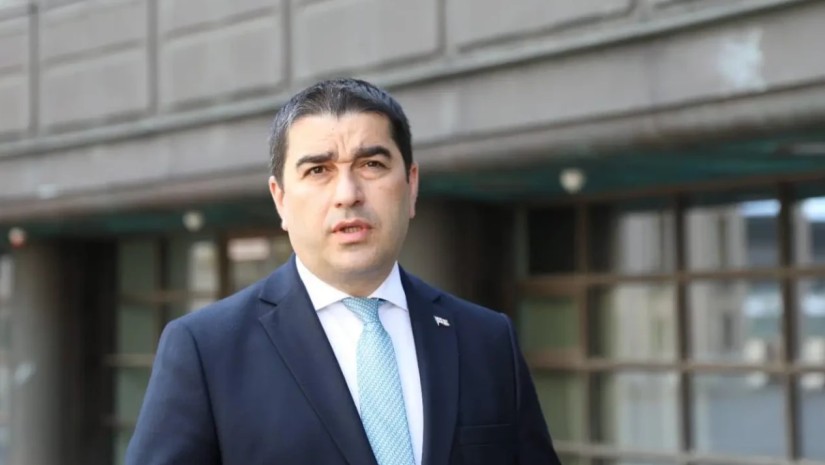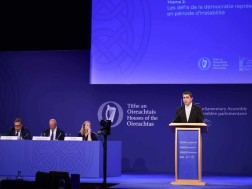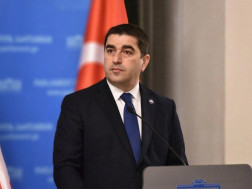The Georgian Parliament Speaker Shalva Papuashvili responded to the Venice Commission’s opinion on the rules for electing Central Election Commission (CEC) members and the special status of the deputy from opposition. According to Papuashvili, it is regrettable that the opinion appears to be more political than legal.
Papuashvili published the response letter sent to the Venice Commission on May 30 regarding the issue.
The letter reads as follows:
“Madam President,
Let me express my gratitude for fruitful cooperation established between the Parliament of Georgia and the Venice Commission throughout the years. As Georgia is moving closer to the European Union membership, we see these bonds as inalienable part of our path towards European integration and it is our genuine desire to develop stronger working ties with the Venice Commission.
The year 2024 is an important political year for Georgian democracy because of the general elections scheduled for late October. The Government’s responsibility is to ensure that the elections are well-prepared and administered according to international standards. The key innovation is the introduction of electronic technology in electoral processes – a crucial reform that creates additional guarantees for the free and fair elections, along with changes in the Election Code from 2022, which were prepared and passed with cross-party cooperation in the Parliament, in the frames of implementing the second EU recommendation for the EU candidate country status.
More amendments to the electoral legislation were aimed at creating a more level-playing field before the elections. For this purpose, the cap for each political party on annual expenditure set by the law was further reduced and the donation by legal persons to political parties was banned (as recommended by the Venice Commission in June 2023 and as envisaged in the Action Plan for Avoiding the Excessive Influence of Vested Interests in Economic, Political and Public Life in Georgia). Moreover, the ID cards without electronic information, issued before 2011, are now void and cannot be used after July 2024.
More recent changes in election regulation further empowered the Central Election Commission by ensuring its stronger legitimacy and less politicization ahead of the Parliamentary elections, and allowed to end the institutional crisis in CEC by electing its leadership with full-time mandate. It also allowed the Parliament to elect CEC chair and members with widest possible inclusivity.
Dear colleague,
I have received the draft joint opinion of the Venice Commission and OSCE/ODIHR on the latest amendments. In view of the partnership between our institutions, in order to maintain constructive dialogue and, more importantly, to make sure that the Venice Commission remains valuable and relevant partner for Georgia’s democratic agenda, it is my kind request to you to consider some of our broader concerns.
Let me start by saying that as I have highlighted before, including during meeting with the Venice Commission delegation in Tbilisi in 2023, we expect the Venice Commission opinions to have solid legal argumentation, backed with best European experiences, derived from across the EU member countries. However, unfortunately, our understanding and perception is that the recommendations are increasingly based on political expediency rather than legal point of view. Moreover, the judgement about political expediency is derived from the experts’ own opinion, rather than any other objectively verifiable, thorough analysis (this in itself could be a precarious exercise as the political expediency of another country certainly requires specific knowledge not necessarily related to legal professions).
For instance, the opinion suggests to maintain a position of deputy CEC chairperson elected from among the opposition party-appointed CEC members. It means that in case of absence of a CEC chair elected from professional members, the opposition deputy CEC chairperson is in charge of CEC. This suggestion is difficult to comprehend as it directly contradicts the Venice Commission’s recommendation itself where it argues that the CEC leadership should be impartial and independent. Moreover, past opinions suggested introduction of qualified majority; and this majority was to be not even 3/5 but 2/3 majority. And this was suggested despite it not being a practice elsewhere in Europe. The Venice Commission often referred to a political April 19 agreement which has not been in force for almost three years. The agreement proved to be flawed politically and practically. I am glad this time the Venice Commission stresses that “it did not recommend on specific solution [based on now irrelevant April 19 agreement]”. But it is surprising that the spirit of the Opinion still follows the April 19 agreement provisions.
The Venice Commission/OSCE-ODIHR experts omit the key issue here – the April 19 model did not work in practice. Indeed, adopting this recommendation on qualified majority, especially with non-functional anti-deadlock, in practical terms, means more deadlocks for the institution. And here we are not talking about theoretical crisis but a real crisis. We have found ourselves in such a crisis since the adoption of this provision. It is important to note that the adoption of such provision, which was designed to relief an imagined political crisis, was not even supported by any significant opposition political party in the Georgia Parliament’s voting.
Georgia has experimented unsuccessfully with the qualified majority rule for two and a half years. It was not derived from inter-party dialogue but was insisted by an external mediator. It is now a fact that it failed, it has not worked, it does not work, and there is no ground to think it will work in future either. The practice shows that the new qualified majority voting draws the sides away from the consensus rather than towards the consensus. If the Georgian authorities followed the Venice Commission recommendations and continued this experimental model, the CEC would have remained in the April 19-created institutional crisis and Georgia would not have had CEC leadership in place by the October elections. Under such circumstances, insisting on returning to a failed rule without legal argumentation is difficult to accept. It is our strong expectation from the experts to recommend the solution to end rather than stay in the crisis.
Our practical experience clearly demonstrates that when extra-ordinary tools are not granted to opposition, then readiness of political sides for more fruitful political discussions and higher chances for consensus follow. In fact, as soon as the minority was not granted some artificial preferences, the amendments adopted by the Georgian Parliament in the Election Code opened the room for classic political deliberations and more political parties engaged in consensus-building. As a result, the CEC chair and members obtained the support of four parliamentary factions/groups that control over 3/5 majority in the Parliament.
Such opinions do not contribute to long-term stability of the system or its legal framework either. Opinions based on perceived context in any given time may be unsustainable. The context may change and, after some time, temporary solutions may become irrelevant. Or the perceived context may be simply wrong that is even more problematic for the legal framework and political system.
The biggest contribution that the Venice Commission can make is to assist and provide guidance to Georgia along this road with the best European standards and practices, not with experimental modalities that, clearly, do not work. Unfortunately, in case of the opinion on amendments to the Election Code of Georgia – none of the European case is demonstrated as a best example, simply because such experimental model suggested by the Venice Commission does not exist anywhere in Europe.
Dear Colleague,
Having said this, the Georgian Parliament is determined to find institutional solutions that are based on legal considerations and the best and well-established European standards derived from the EU member states that stand the test of time. This is how we approach these opinions and this is how we will scrutinize these recommendations in detail.
Let me convey our genuine readiness to engage in bilateral (with Venice Commission) or multilateral meetings (with Venice Commission, OSCE/ODIHR and European Commission), with an understanding that political considerations as well as conclusions based on time-restricted contexts will not undermine the otherwise healthy basis of our discussions.”
















